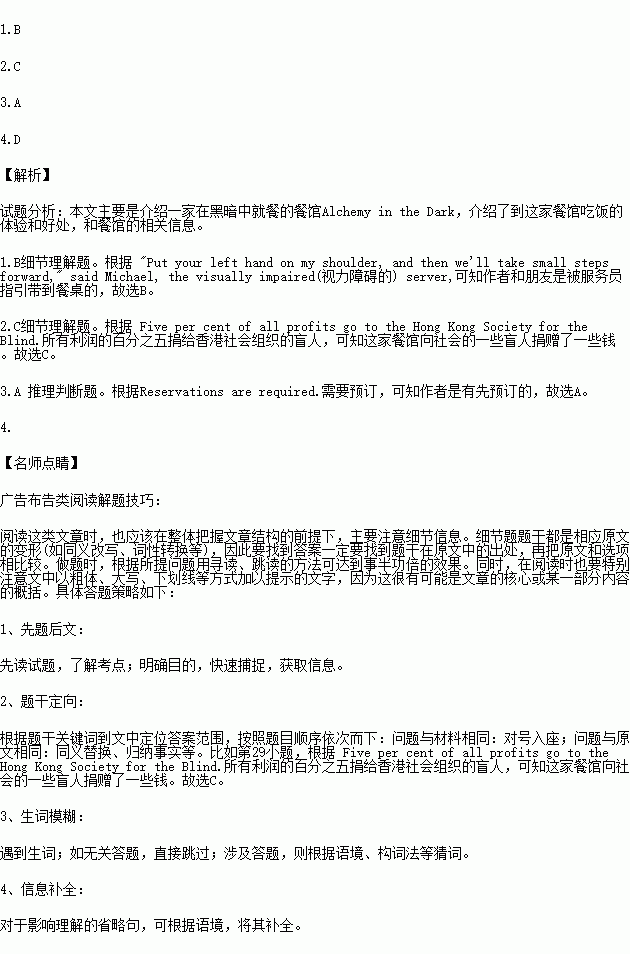题目内容
Soup on my nose, a nearly spilled glass of wine and chocolate down my white blouse, as blind dates suggest, this was a really messy one. I have never made so much noise with plates and glasses, nor had I dined with a never-before-met companion. This blind date was quite different: we could see nothing. "Put your left hand on my shoulder, and then we'll take small steps forward," said Michael, the visually impaired(视力障碍的) server, in an East London accent. We three felt our way carefully bumping past heavy curtains before being arranged at the dining table, where we would eat and drink three completely secret and unseen courses.
Welcome to Alchemy in the Dark, Hong Kong's first full-time restaurant in total darkness. Upon arrival, diners briefly tell the chef on their allergies(过敏性反应), lock away their mobile phones and enter the windowless restaurant, which can seat 25. When the meal is over, the contents of the delicious menu are shown --- often to the diners' surprise. "This is definitely duck," my friend said, while eating chicken. "This soup," I declared, "is carrot and coriander." Even the too-close smell did not reveal the real tomato and cumin flavors. Dining in the dark changes everything: the sense of smell is heightened, manners go out of the window ----using your hands to feel around the plate becomes normal--- and there is a strange thrill in being able to ignore your facial expressions. Best of all? You don't have to spend hours beforehand(事先) wondering what to wear.
Alchemy in the Dark is at 16 Arbuthnot Road, Central, (tel: 6821 2801) and is open Monday to Saturday, from 7pm to 11pm. Reservations are required. A three-course meal with wine pairing costs HK$700 per person. Five per cent of all profits go to the Hong Kong Society for the Blind.
1.How did the author and her companion arrive at their dining table?
A. By using a map
B. By being led
C. By feeling their way.
D. By finding it by themselves
2.According to passage, which of the following is true?
A. The diners might eat what they are allergic to.
B. The author enjoyed a special lunch at Alchemy in the Dark.
C. The restaurant donated some money to the H. K Society for the Blind.
D. The diners aren’t allowed to take phones to the restaurant at any time.
3.From the passage we can learn that the author ___________.
A. had the table booked
B. shared the meal with a friend.
C. practiced how to eat in total darkness.
D. chose her clothes in advance for the meal.
4.The last paragraph is intended to ____________.
A. present some facts about eating in the dark.
B. inform what to do at Alchemy in the Dark
C. conclude the experience of eating at Alchemy in the Dark.
D. provide some information about Alchemy in the Dark.
 孟建平小学滚动测试系列答案
孟建平小学滚动测试系列答案 黄冈天天练口算题卡系列答案
黄冈天天练口算题卡系列答案
